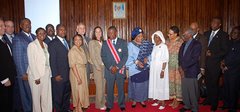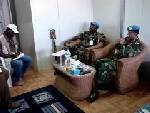Barely a day after science students of the highest institution of learning in the country, the University of Liberia staged a one protest action in demand of buses to take them on their science college campus in Fendell, outside the campus, the Spanish Government today pledged 12 buses to help ease the country’s transport problem.
The pledge was made today by outgoing Spanish Ambassador to Liberia, Francisco Tejada, during a farewell visit to the Liberian leader, President Ellen Johnson Sirleaf.
During his visit, Ambassador Tejada said the Spanish private sector and the Municipality of Barcelona are donating the buses in order to help the Liberian Government address the country’s transport problem.
Yesterday regular academic activities at the State owned University came to a halt yesterday after hundreds of students protested in demand of normal transportation facilities in order to allow them to attend classes on time at the Fendell campus.
The Fendell campus is an extended facility of the University of Liberia which is about 22 miles outside Monrovia mainly for students specializing in Science, Technology and Agriculture and Forestry.
The main campus of the University of Liberia where the student protest was launched is located directly opposite the Ministry of Foreign Affairs where the Liberian President is temporarily sitting and steering the affairs of the nation.
Following brief meeting with the Liberian leader, the protestors, according to Liberian Information Minister, Lawrence Bropleh announced the availability of additional buses to transport the student from the main campus of the University to the Fendell campus.
Wednesday, June 6, 2007
In U.S. V.P Boakai Urges More Investors To Come to Liberia

PROVIDENCE — Liberia is literally turning on its lights, restoring power and water and repairing infrastructure destroyed by prolonged civil war. But the country still desperately needs help as it works toward a peaceful, productive future, its vice president said yesterday.
Vice President Joseph N. Boakai said that includes training a new work force, rebuilding schools, hospitals and banks, and harnessing the county’s rich natural resources that became the spoils of war.
During a national tour of Liberian diaspora communities that include Rhode Island, Boakai said his homeland is seeking private investment, such as a $1-billion agreement forged in 2005 with Mittal Steel for mining iron ore.
Training and education of the country’s youthful majority is also a major focus. And, said Boakai, one key will be to provide salaries that will draw people “from more comfortable circumstances” in other countries.
Liberia's Vice President -J. N. Boikai
“We need everything,” said Boakai. “We need vocational training. We have to train our young people — we need auto mechanics, electricians, nurses, doctors.” Future efforts will include development of tourism and high-tech industry, Boakai said.
Boakai visited Rhode Island during his tour of Liberian diaspora communities across the country. Rhode Island’s estimated 15,000 Liberians constitute the country’s largest Liberian population per capita.
The Liberian Community Association of Rhode Island, headed by Mator M.F. Kpangbai, hosted Boakai’s visit. It included his news conference at the Urban League of Rhode Island, after which he was scheduled to meet with Governor Carcieri and Providence Mayor David N. Cicilline, among others.
At the Urban League, Boakai expressed hope that Liberia will continue to work free of corruption that previously formed “the bedrock of our society,” and maintain the fragile peace established after the decades-long war ended in 2003.
He praised President Ellen Johnson Sirleaf, the first female president in any African country, who ran on an anti-corruption platform. Johnson Sirleaf’s 2006 visit to Rhode Island drew thousands of people who cheered her speech on the steps of Providence City Hall.
“She is a great, great lady,” said Boakai.
He also expressed faith that the United States will continue offering temporary protected status to Liberians here who have been extended that status since they fled the civil war. Although some Liberians are returning, Boakai said the war’s devastation makes it impossible, for now, to support a wholesale return.
“We want to appeal to Americans to exercise patience. If you send [Liberians] back home, we don’t have anything for them to do,” he said.
And, he said, he has encouraged the peace and reconciliation process headed by a special committee.
“If and wherever there’s been corruption … if somebody’s been doing something wrong, we will prosecute anybody. We will not leave anyone out.”
As Boakai prepared to leave for his meetings with Cicilline and Carcieri, the audience of several dozen people was asked to observe protocol as the vice president made his exit.
“Do we get to shake his hand, man?” asked one man in the crowd, drawing laughs.
Boakai ignored his pressing schedule, and shook hands with everyone in the room.
Source: Rhode Island news
Vice President Joseph N. Boakai said that includes training a new work force, rebuilding schools, hospitals and banks, and harnessing the county’s rich natural resources that became the spoils of war.
During a national tour of Liberian diaspora communities that include Rhode Island, Boakai said his homeland is seeking private investment, such as a $1-billion agreement forged in 2005 with Mittal Steel for mining iron ore.
Training and education of the country’s youthful majority is also a major focus. And, said Boakai, one key will be to provide salaries that will draw people “from more comfortable circumstances” in other countries.
Liberia's Vice President -J. N. Boikai
“We need everything,” said Boakai. “We need vocational training. We have to train our young people — we need auto mechanics, electricians, nurses, doctors.” Future efforts will include development of tourism and high-tech industry, Boakai said.
Boakai visited Rhode Island during his tour of Liberian diaspora communities across the country. Rhode Island’s estimated 15,000 Liberians constitute the country’s largest Liberian population per capita.
The Liberian Community Association of Rhode Island, headed by Mator M.F. Kpangbai, hosted Boakai’s visit. It included his news conference at the Urban League of Rhode Island, after which he was scheduled to meet with Governor Carcieri and Providence Mayor David N. Cicilline, among others.
At the Urban League, Boakai expressed hope that Liberia will continue to work free of corruption that previously formed “the bedrock of our society,” and maintain the fragile peace established after the decades-long war ended in 2003.
He praised President Ellen Johnson Sirleaf, the first female president in any African country, who ran on an anti-corruption platform. Johnson Sirleaf’s 2006 visit to Rhode Island drew thousands of people who cheered her speech on the steps of Providence City Hall.
“She is a great, great lady,” said Boakai.
He also expressed faith that the United States will continue offering temporary protected status to Liberians here who have been extended that status since they fled the civil war. Although some Liberians are returning, Boakai said the war’s devastation makes it impossible, for now, to support a wholesale return.
“We want to appeal to Americans to exercise patience. If you send [Liberians] back home, we don’t have anything for them to do,” he said.
And, he said, he has encouraged the peace and reconciliation process headed by a special committee.
“If and wherever there’s been corruption … if somebody’s been doing something wrong, we will prosecute anybody. We will not leave anyone out.”
As Boakai prepared to leave for his meetings with Cicilline and Carcieri, the audience of several dozen people was asked to observe protocol as the vice president made his exit.
“Do we get to shake his hand, man?” asked one man in the crowd, drawing laughs.
Boakai ignored his pressing schedule, and shook hands with everyone in the room.
Source: Rhode Island news
Subscribe to:
Comments (Atom)


